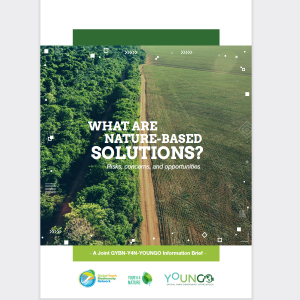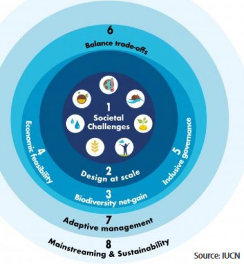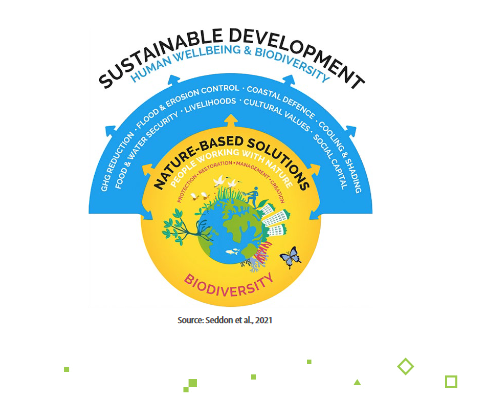
How can stakeholders balance the potential risks, drawbacks and concerns of the Nature-Based Solutions Framework with its benefits and opportunities? A brief is now available pertaining to this very topic. As a partnership between Global Youth Biodiversity Network, Youth4Nature and YOUNGO, the document is titled, “What are nature-based solutions? Risks, concerns and opportunities'', and was prepared by Mirna Inés Fernández and Marina Melanidis. Additional contributions from Heeta Lakhani, Cathy Li, Sebastien Willemart, Julian Lo Curlo, Amelia Arreguin and Christian Schwarzer made the work possible.
The report describes risks and alludes to potential drawbacks of the NbS framing. The brief covers the standard definitions brought forth by the IUCN and EU for Nature-based Solutions. One major criticism of the NbS framework is its alleged ambiguity and the potential for greenwashing. NbS can serve as an umbrella term for a wide array of ecosystem services and solutions, therefore it remains vital to highlight that there is indeed a shared overarching understanding of what criteria NbS has to fulfil.
Another challenge for NbS brought forth in the report is the risk of being overly simplified. For example, benefactors of projects which plant trees, should take care to avoid monocultures and foster solutions that support biodiversity. Critics of NbS are also concerned that there is insufficient research to show if NbS is cost effective and reliable enough to tackle both biodiversity and climate change mitigation. Proponents of NbS need to ensure that projects are designed in such a way that they can tackle biodiversity and climate change while also advancing other sustainable development goals.
The report also highlights the potential of NbS to create colonialist dynamics. When funding for environmental projects are sent to the global south, great care should be taken that these projects are not used in order to offset carbon activity in the global North without reform on their behalf. And that indigenous knowledge and rights are taken into consideration, when implementing projects outside the European Union.
These challenges and criticism should be taken seriously, however there is also a lot to be said for the potential benefits of NbS. NbS has shown success in facilitating interdisciplinary solutions that are readily implemented and replicated across cities. This potential for cross-sectorial cooperation helps to secure funding for vital environmental initiatives.
Nature-based solutions are here to stay - and those implementing them should take criticism on board and address it where possible, while also looking towards a cooperative and just future. As the brief outlines: “In order for NbS to be a part of the transformational change we need, they must truly centre biodiversity, people, and justice.”
To access the full brief and find more resources like this one, please access the brief here here.


